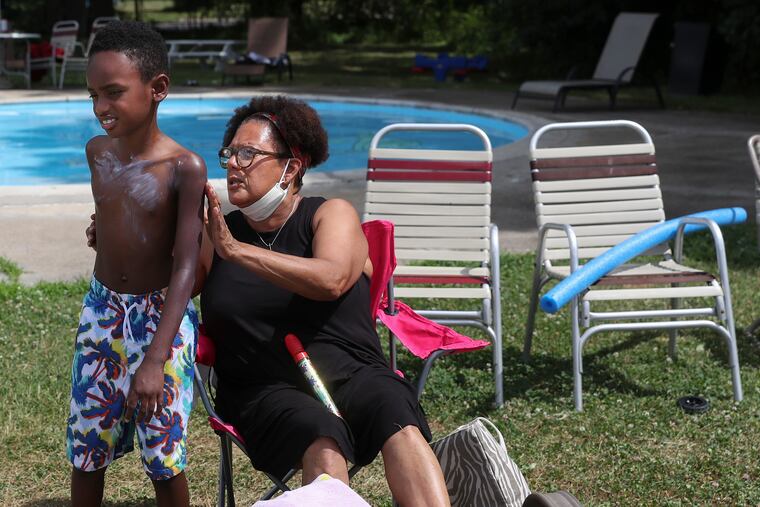In an all-time hot July, not a single heat death is reported in Philly, continuing a trend
Heat-wave deaths are down all over the country, says a heat-wave expert. And you can thank Philly for that.

Philadelphia’s third-hottest July since the government began keeping score in 1871 put up some eye-popping numbers, tying a record for 90-plus temperatures and just missing one for warm nights.
But perhaps its most surprising and welcome number in the summer of COVID-19 was 0 — as in zero heat-related deaths. That appears to be a part of a trend in the developed world, even as the planet continues to warm.
“There’s been a significant decline in heat-related mortality,” said Michael J. Allen, a professor at Old Dominion University, and an expert on hot weather’s impacts on health. He said that the incidence of heat-related illness also appears to be declining.
It is not at all clear if those trends will continue, he said, and urban areas such as Philadelphia and cities in less-developed nations still have large vulnerable populations. More than a third of Philadelphia residents 60 and over live alone, according to the Philadelphia Corporation for Aging.
However the trends in Philadelphia have been remarkable, and Allen said Philadelphia in turn has a whole lot to do with the overall trend.
» READ MORE: Heat deaths are down 'not just in Philly, but everywhere'
In the 10-year period starting in 1993, a total of 399 heat deaths were recorded in the city. In the most-recent 10-year period, 83.
July 1993 was the deadliest one summer-month record for in Philadelphia, with 118 heat-related fatalities.
But July 2020 actually was warmer, with an average temperature of 81.9 degrees, compared with 81.4. The average overnight low, 73, was the second-warmest on record. Twenty-one days had temperatures of 90 or better, tying the record. The average daily low temperature last month, 73, was just shy of the record, 73.1, set in 2013.
What’s behind the trend?
It’s possible that people are getting used to all this heat, said David A. Robinson, the New Jersey state climatologist. Robinson points out that recent summers haven’t had quite the same extremes as those of the 1990s. The summer of 1993 had three days of 100-plus temperatures.
However, increased humidity related to the worldwide warming could be capping daytime temperatures, since it would keep the sun from directing all its energy to heating the ground, and moisture in the air would contribute to overnight warming by trapping in daytime heat.
» READ MORE: Philly sets a temperature record, and new standards for warm nights. The 1960s were way cooler.
Health experts have said that nighttime warming is dangerous because it allows houses without air-conditioning to heat up in a hurry. Robinson said that it’s possible that early-season heat might be helping people build up tolerance for later heat waves, allowing them to leverage what little nighttime cooling has been available.
But Allen and others believe the key to mitigating mortality has been the increased awareness of heat’s dangers, and that, he said, has everything to do with Philadelphia, with a major — and tragic — assist from Chicago.
Are we doing something right?
When the late Dr. Haresh Mirchandani became Philadelphia’s medical examiner in 1991, no one was quite sure how many residents had died from heat through the years.
Hyperthermia — a core body temperature of 105 — was the standard for a heat death, but Mirchandani reasoned that his investigators could get to only a small percentage of the deceased in time to make that determination.
Higher-than-average death rates on excessively hot days supported his hypothesis that heat was a factor.
He told his investigators to look for proxy evidence in the homes of the deceased; for example, closed windows and absence of any cooling devices.
In 1993, Philadelphia’s high death counts were viewed skeptically by officials in other cities where it was hot and few fatalities were reported. However, the Centers for Disease Control had Mirchandani’s back and affirmed that the city was doing it right and encouraged others to follow Philly’s lead.
Two summers later, the city launched its aggressive heat-wave response system, linked to the National Weather Service, which the year before had fired up its language with the term “excessive heat warning.”
The program included steps as simple as encouraging block captains and neighbors to look in on the elderly live-alones, and commissioned the Philadelphia Corporation for Aging to extend its “helpline” hours.
» READ MORE: Philly was under a heat emergency for part of July
That same summer, Chicago drew national attention to the dangers of heat by reporting over 700 heat-related deaths. In September 1995, Chicago created its Office of Emergency Management and Communications, and worked up its response plan.
“It is safe to say that we have not experienced anything close to 1995,” said the office’s Mary May.
The Chicago plan includes robo-calls to seniors, she said, and a concept borrowed by Philadelphia — the use of public-transit buses as makeshift cooling centers, a practice started about 10 years ago.
Other cities have established similar protocols.
Philadelphia has used several SEPTA buses for cooling this summer, along with closed libraries and schools as the coronavirus has complicated the use of conventional cooling centers.
Ironically, said Old Dominion’s Allen, the coronavirus might have had a positive effect during July’s steamy heat: Fewer people were leaving town so they might have been around to look in on elderly neighbors.
The incredible European heat wave of 2003, blamed for killing 50,000, occurred during the peak August vacation season when friends, relatives, and neighbors might not have been around to look after the vulnerable.
Fortunately, no new heat emergencies are in sight for Philadelphia, although a heat advisory is up for Sunday with triple-digit heat indexes possible. For the rest of the week, highs are forecast to stay in the 80s.
After July, that might feel like a cold wave.